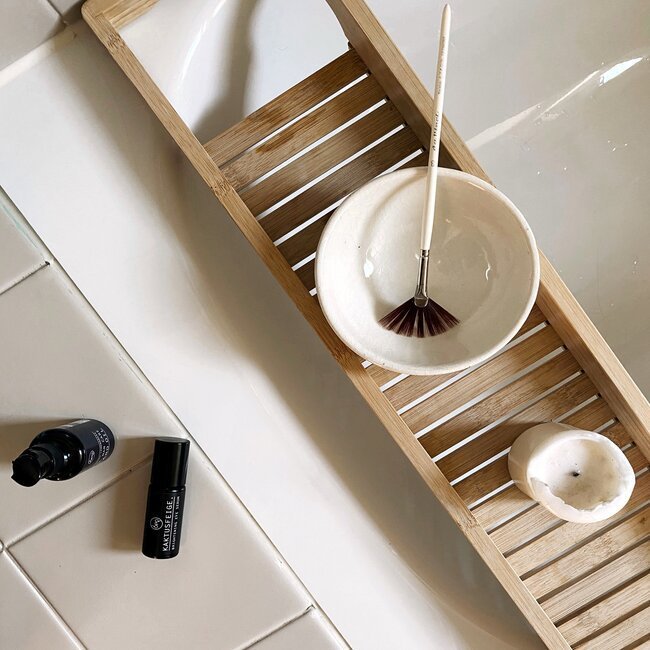
(Peri-) Menopause, the so-called menopause & your skin
Which skincare products do you recommend during menopause?
We get asked this question quite often. Through my own experiences and discussions with our long-time business partner, hormone coach Corina Dettling (Corina has been using bepure products in her holistic massage treatments for years), I began to delve deeper into the topic of menopause. And suddenly I have a much better understanding of what's happening in my body and how my skin develops.
Did you know that women can enter perimenopause as early as 35 and reach menopause as early as 45?
That sounds a bit harsh, but it doesn't mean that a woman is suddenly "old." It's a natural process that we all go through (some sooner, some later).
The female body changes with age. This is nothing unusual, and we should be able to talk about it openly and support each other with this topic. Menopause doesn't come suddenly.
These changes happen gradually, yet can sometimes be massive. Hormonal changes can alter our sleep, mood, stress resilience, health, weight, and skin, all of which can lead to problematic skin.

Corina D. told me: "...Women often tell me that they're still menstruating, meaning they're not yet in menopause, but when I list the various symptoms that point to menopause, they affirm it. It's often not that easy to recognize the first signs of menopause. The hormonal changes aren't always associated with symptoms and are very different for every woman..."
Corina offers hormone counseling and specialized online courses . A free initial 30-minute consultation via Zoom or phone will help you determine which program is right for you.
There are many different signs and symptoms that can indicate that menopause has begun. Not all symptoms always appear at once; this, like the timing, is entirely individual. However, if you know your body well, you'll certainly notice even smaller changes.
Some symptoms and symptoms that may occur in connection with menopause:
- Hot flashes
- Night sweats
- Dry skin
- Thinner, looser skin
- Skin irritations
- impure skin
- more sensitive skin
- Lower stress resilience
- Vaginal dryness
- Hair and skin problems
- Weight gain
- Sleep disorders
- Bladder weakness
- Anxiety and panic attacks
Not all symptoms have to occur at the same time, or even at all. How you experience menopause varies from woman to woman. There are tips and tricks for these symptoms that can provide relief and make it easier to cope with them.

Menopause can be divided into four or three phases:
Premenopause: During this phase, hormone production gradually declines and the menstrual cycle slows down. Officially, this isn't yet considered menopause, as it's the time when the body prepares for the next phase. Premenopause begins several years before menopause. When exactly it begins varies greatly from woman to woman, which is why it's difficult to define a precise age or time period. You can tell when you're entering this phase by the fact that your periods become more irregular, because the body already begins to slowly reduce hormones during this phase.
- Perimenopause (i.e., the transition to menopause): The first phase is the start of menopause and begins on average at 47.5 years. It can vary greatly from person to person and begin much earlier. The ovaries produce less and less progesterone, a sex hormone that prepares the uterine lining for implantation of the fertilized egg. This results in irregular menstrual cycles, with periods occasionally missing. Furthermore, less estrogen is produced. Perimenopause can last very briefly, a few months, or for up to eight years.
- Menopause: Menopause occurs around the age of 51. This is the period of 12 months without bleeding after the last menstrual cycle. Colloquially, menopause is often equated with the menopause itself. However, menopause is only one of several phases that accompany us through menopause.
- Postmenopause: Postmenopause is the period after the last menstrual period. The female body then produces virtually no estrogen.

The hormone estrogen plays a major role in the production of collagen and elastin. Estrogen receptors are found throughout the body. Estrogen helps maintain moisture levels and keep the skin looking and feeling hydrated. It also increases the production of the skin's own oil (sebum) to keep the skin moisturized.
As we go through perimenopause, estrogen levels decrease, and with them, collagen production. This can cause the skin to become very dry. Lower collagen levels lead to skin that is no longer as firm as it once was.
It also reduces our defenses against oxidative stress (which leads to free radical damage and further affects our collagen production). When the skin suffers from estrogen deficiency, hyperpigmentation can increase, appearing not only on the face but also on the chest, arms, and neck.
All of these factors contribute to thinning skin, increased wrinkles, decreased elasticity, and increased dryness (which further accentuates wrinkles). For some women who already tended toward dryness, this results in a whole new level of dryness.
A Skin & Hair Care Tips for Menopause
1. Cleaning
Due to the lack of moisture and the slowed regeneration of the skin, the protective layer becomes even more fragile and reacts more sensitively to ingredients. Use a mild cleanser without high-foaming surfactants and emulsifiers that won't damage the skin's acid mantle and cause further dehydration. Water is generally sufficient for morning cleansing.
2. Moisture + Occlusion
Well-hydrated skin (through hydrolates, glycerin, hyaluronic acid,...) is plumper, smoother and can perform its function better, i.e. the skin is calmer with less redness.
The moisture content of the skin is therefore more crucial in the aging process than active ingredients.

We love this duo. The oil-free combination of both products , BALANCING TONIC (100 ml) and SOOTHING NECTAR HYDRATION SERUM (30 ml), creates a lightweight emulsion that provides long-lasting moisture (thanks to hydrolats, glycerin, AND multiple hyaluronic acids), smoothes, and also has a pleasantly cooling effect on "hotter menopausal skin."
Hormones fluctuate, meaning the amount of moisture needed can change frequently. The best part of the duo is that you can adjust the moisture level for days when you feel especially dry, then simply add a few more drops of Soothing Nectar.
However, moisture and water-based products alone are not enough, because in order to bind the moisture in the skin, substances are needed that repair the skin barrier.
Valuable plant oils such as ROYAL NIGHT SERUM , BRIGHTENING EYE SERUM & MIRACLE BEAUTY provide vitamins, fatty acids, phytosterols and antioxidants, which protect mature skin from oxidative stress and environmental influences and repair the skin barrier.
Caution: You should avoid mineral oils such as paraffins or silicones because they seal the skin tightly, preventing the production of certain enzymes necessary for regeneration. This results in even more dryness and the possibility of blemishes.

4. Retinol & Co. If you want to incorporate powerful active ingredients like vitamin C, retinol, and AHA acids into your skincare routine, which can help reduce dark spots, start gradually. Also, keep in mind that vitamin C, for example, makes your skin even more sensitive to UV radiation. If you experience a skin reaction, avoid using them until your skin has recovered.
5. SPF is essential. You should avoid prolonged sunbathing in the blazing sun, as thinner skin becomes even more sensitive to light. In addition to sunscreen with at least SPF 30, you should always ensure adequate protection through clothing, a hat, and sunglasses.
6. Important care in the intimate area
With increasing age, the mucous membrane in the intimate area becomes drier, thinner, and more susceptible to irritation. Dryness in the intimate area not only affects everyday well-being, but potentially also sexual pleasure. Many problems can be prevented with proper care.
Water is perfectly sufficient for daily cleansing. Even with moisturizing "intimate wash lotions," pay close attention to the ingredients and avoid products containing multiple surfactants, perfumes, and alcohols. These substances can increase dryness.
The delicate skin in the intimate area needs just as much care as our face, yet it's often overlooked. Washing dries out the skin. Oil nourishes and protects the skin. However, only high-quality products should be used for this.
Cold-pressed and pure vegetable oils such as argan oil , almond oil or coconut oil are very suitable because they do not contain any preservatives or fragrances.

Unsaturated fatty acids taken orally can also help with dry skin and mucous membranes. They are found in fish oil, linseed oil, or sea buckthorn capsules, for example.
7. Hair loss during menopause
To stimulate hair growth, we recommend our REPAIR HAIRCARE treatment for dry scalp and hair with five plant-based oils. Argan oil and castor oil provide moisture and shine, promoting healthy growth and strong hair. You can apply the oil to the roots or massage it into your scalp.
Tip: Always massage onto slightly damp skin and leave on overnight, ideally. You may want to place a small towel on your pillow for protection. Rinse thoroughly the next morning with a mild shampoo. No oil residue will remain in your hair.

8. Promote blood circulation
Skin with good circulation can absorb nutrients better. Gentle facial massages , dry brushing, contrast showers, and sauna visits are not only relaxing rituals, but also act on the body and circulation like gentle movements. They also relieve tension, promote lymphatic flow, and firm the skin.
B Preservatives & hormone-altering substances
Endocrine disruptors act on the same hormone receptors as the female and male sex hormones. They block the cell receptors of our own hormones, preventing them from working. They slow down enzyme reactions needed to convert one hormone into another. They strain and weaken the liver and intestines . They lead to hormone dominance, such as an excess of testosterone, insulin, cortisol, or estrogen. They also suppress thyroid function.
Preservatives such as formaldehyde, benzoic acid, parabens, and methylisothiazolinone are used in many conventional cosmetics to extend their shelf life. These are synthetic preservatives designed to keep fungi and bacteria out of cosmetic products. They are often found in shampoos, hair conditioners, deodorants, shower gels, and facial scrubs.
Parabens are known to trigger allergies and have hormonal effects. Benzoic acid is also classified as a corrosive and lung-damaging substance in toxicology.
Recognizable by the INCI: Methylparaben, Ethylparaben, Propyparaben, Butylparaben and Heptylparaben
Mineral oil and petrolatum. Mineral oil is a clear, odorless oil derived from petroleum and is popular in the skincare industry because of its low price, long shelf life, and low risk of causing reactions. It also doesn't really have much effect on the skin. It's a cheap base oil for many moisturizers, cleansers, and body oils. Mineral oil is a byproduct of the petroleum industry. Within the EU, it must be refined and processed to meet cosmetic standards for use on skin, and it is tested to ensure it is not contaminated with carcinogens.
BUT: Dry skin initially feels good. However, the mineral oil film dries out the skin and destroys the skin barrier, clogs the sebaceous glands, causes pustules, prevents the skin from excreting nutrients and absorbing active ingredients, promotes circulatory disorders such as couperose and rosacea, leads to hyperkeratosis and flaking of the epidermis, causes pigment spots, and massively accelerates skin aging! Oils should always be natural!
Recognizable by the INCI: Paraffinum liquidum, Petrolatum, Petroleum, Paraffin Oil, and Paraffin Wax, Mineral Oil, Cera Microcristallina, Microcristalline Wax,
Chemical UV filters , such as benzophenone, ethylhexyl, dimethyl, benzophenone-3-5, and octocrylene, are intended to protect against the sun's harmful UV rays. However, some of these chemical filters are suspected of disrupting hormones and impairing fertility. They are often found in skin creams, sunscreens, and lip balms.
Silicones Cyclopentasiloxane , cyclotetrasiloxane and cyclomethicone are questionable in leave-on products such as creams or lipsticks because they are skin irritants and they also have hormone-active properties.
Furthermore, cyclotetrasiloxane is classified as harmful to reproduction and should be avoided. Furthermore, traces of the latter can contaminate cyclopentasiloxane. Finally, a communication published in April 2015 by the European Commission's Scientific Committee on Consumer Safety on the evaluation of cosmetics pointed out an inhalation risk: these compounds should be avoided in aerosols, sprays, powders, etc.
Cyclomethicone consists partly of the two other substances cyclopentasiloxane and cyclotetrasiloxane. (Source: konsumentschutz.ch)
Other silicones are Dimethicone, Methicone and polysiloxanes
Phthalates are plasticizers used to make plastic tubes and product containers, among other things. These substances (phthalic acid, phosphoric acid) are also added to the contents themselves to keep them flexible and pliable. Even products that list "fragrance" as an ingredient contain phthalates, and they have been shown to disrupt hormone levels.
Commonly found in... cosmetics, body lotion, nail polish, shower gels, skin care products, perfumes, component of chemical fragrances, effects on hormonal balance, linked to infertility and low hormone levels.
Recognizable by the INCI: Dibutyl phthalate, diethyl phthalate, di-2ethyhexyl phthalate or "all" phthalate
Polyethylene and polymers are among the most commonly used plastic fibers. They are smaller than five millimeters, are synthetically produced, and can be recycled through the decomposition of
Plastic waste in the environment degrades into nanoplastics. Furthermore, additives such as plasticizers, stabilizers, fillers, and pigments are added to plastic polymers to impart the desired properties to the final product.
Commonly found in …scrubs, toothpaste, tampons and sanitary pads
Sunscreen, lipstick, eye shadow, powder, nail polish. Microplastics not only harm the environment. They can also enter the human digestive tract via the food chain and accumulate in our organs.
C Holistic tips
1. Movement
Regular, moderate exercise such as swimming, jogging, hiking, cycling, or yoga promotes endurance and prevents a decline in performance during menopause. Physical activity stimulates the circulation and relaxes the mind.
2. Stress management
Due to the declining estrogen levels during menopause, the body is no longer able to regulate cortisol levels as effectively as before. As a result, certain situations are more quickly perceived as stressful. A permanently elevated stress level can, in turn, promote skin and hair problems.
It's important to regularly reflect on your own stress levels and find out what helps you. Listen to your body. Depending on how you feel that day, it's easier or more difficult to deal with emotional stress. Meditation, walks in nature, taking conscious breaks for yourself, and digital detox can all help reduce stress and mentally let go.
3. Get enough sleep
Lack of sleep is a known cause of irritability and hypersensitivity. During sleep, our skin regenerates, our hormone balance is restored, and stress is reduced. If we get enough hours of sleep—including the all-important deep sleep—sufficient growth hormone is released. This stimulates the production of the connective tissue protein collagen, which is responsible for youthfully firm and elastic skin. If our body lacks sleep, our skin can age prematurely and lose its tone and elasticity too soon.
4. Nutrition
As estrogen levels decline, so does female health. While the body requires less energy with age, the need for nutrients increases, as these are often less readily absorbed. Therefore, foods with low energy but high nutrient content are particularly suitable.
Drier skin = drier mucous membranes. Foods high in omega-3 fatty acids (e.g., mackerel, salmon, linseed oil, rapeseed oil) or the intake of high-quality products help keep all mucous membranes in the body well moisturized. This allows them to actively fight off external pathogens.
For vegetarians or people who do not like or tolerate fish, there are capsules made from:
- Microalgae oil
- Evening primrose oil
- Pomegranate seed oil (Your advantage: high-quality antioxidants that destroy aggressive substances in the body and thus protect the cells and have a slight estrogen-like effect)
Bonus: Evening primrose oil gently regulates hormone levels. Its gamma-linolenic acid balances sebum production, ensuring smooth skin. This also applies to brittle fingernails and hair. It activates the metabolism and promotes inner and outer well-being.
Valuable cold-pressed organic evening primrose oil supports the skin care of mature and dry skin from the outside and is contained in ourROYAL NIGHT SERUM . 










Leave a comment
This site is protected by hCaptcha and the hCaptcha Privacy Policy and Terms of Service apply.